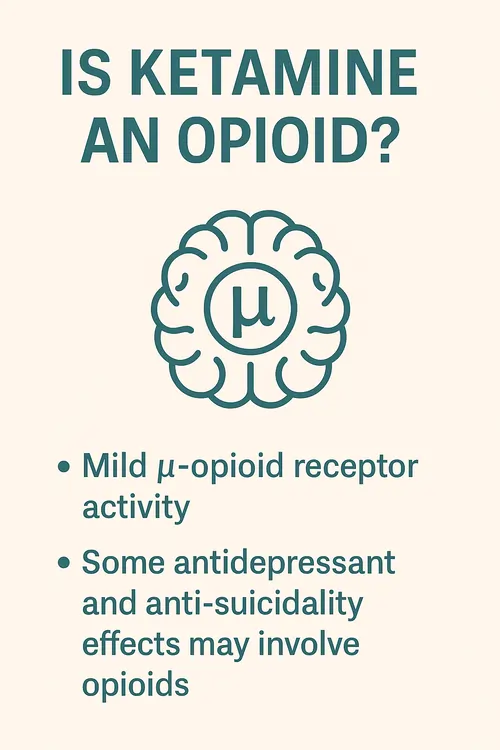Is Ketamine an Opioid?
Ketamine interacts with opioid receptors, but is ketamine an opioid?
*IV Ketamine, NR, and NAD+ have been used clinically off-label for decades. They are not FDA approved for the treatment of any psychiatric or pain condition. All medical treatments carry risks and benefits that you must discuss with a doctor at Clarus Health to learn if these therapies are right for you.

Is Ketamine an Opioid?
The short answer: No, ketamine is not an opioid. But ketamine does have important interactions with opioid receptors, making the real answer more nuanced.

Why is Ketamine not an Opioid?
Opioids are drugs that primarily work by binding to opioid receptors in your brain and body. Common opioids in medical practice include morphine, oxycodone, and fentanyl.
Ketamine, on the other hand, is classified as an NMDA receptor antagonist. It works mainly by blocking a different type of receptor in your brain called the NMDA receptor. This is why ketamine belongs to a completely different drug class than opioids.
The Plot Twist: Ketamine and Opioid Receptors
Here's where things get interesting. While ketamine isn't an opioid, recent research shows it does have a modest effect on something called the mu-opioid receptor. This is the same receptor that traditional opioids target heavily.
A 2018 study found that ketamine interacts with opioid receptors in complex ways, even if less weakly than opioids like morphine.
The Naltrexone Connection: Ketamine and Opioid Receptors
This weak opioid activity might be more important than scientists first thought. This is because in 2018, researchers at Stanford discovered that blocking opioid receptors can reduce the benefits of ketamine.
The researchers pre-treated patients with naltrexone (an opioid receptor blocker) and found that:
- Naltrexone pre-treatment reduced the anti-depressant effects of IV ketamine in patients with treatment-resistant depression
- Naltrexone also reduced the anti-suicidality effects of IV ketamine
This suggests that ketamine's mild interaction with opioid receptors might actually contribute to how it helps depression and suicidality, even though that's not its main mechanism.
Why This Matters
Understanding these connections helps doctors use ketamine more effectively and safely, especially in counseling patients on which medications to stop before ketamine therapy. However, not all studies combining naltrexone with ketamine have shown negative effects, and it is very important to work with a doctor who can weigh the risks and benefits of stopping or starting different medications.
The Bottom Line: Is Ketamine an Opioid?
Ketamine is not an opioid, but it's not completely separate from the opioid system either. It's like a Swiss Army knife that has multiple tools, with its main tool being NMDA receptor blocking and a smaller tool being mild opioid receptor activation.
This complexity is part of what makes ketamine such a promising treatment for depression and other conditions that haven't responded well to other medications.
Can IV Ketamine Help Your Depression?
Depression and its complications can be painful and complex to treat, often complicated by overlapping conditions such as suicidal ideations, anxiety, PTSD, and chronic pain. Emerging evidence strongly supports the use of IV Ketamine and Spravato as promising modalities to address these challenging complications. Both therapies demonstrate a potential for rapid and sustained efficacy in improving depressive and suicidality symptoms. Schedule a free consultation with Clarus Health to learn if Ketamine may be effective in supporting your mental health.




